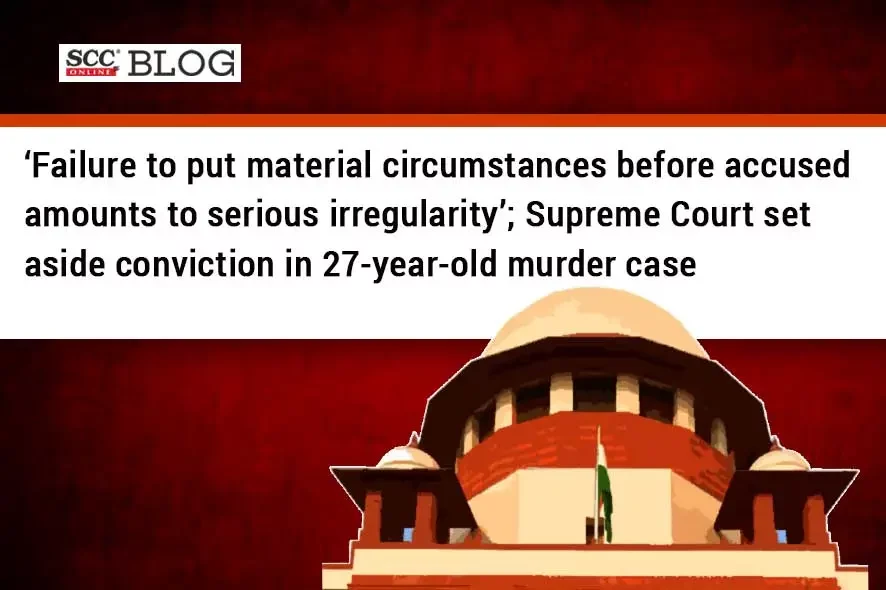Supreme Court: In a Criminal Appeal against conviction by the Trial Court in 2003 for offences under Section 302, 307 read with Section 120B of the Penal Code, 1860 (‘IPC'), sentence of life imprisonment and rigorous imprisonment for 7 years, which was confirmed by the High Court, the Division Bench of Abhay S. Oka* and Rajesh Bindal, JJ. set aside the appellant's conviction for being vitiated and directed the State to set him at liberty.
It was alleged that the appellant along with 6 others conspired to criminally intimidate and commit murder of a target and his relatives due to personal enmity, entered their house when other accused persons fired bullets, attacked using daggers and knives, resulting in death of one.
The Court acknowledged that the only allegation against the appellant was that he was standing outside the house with a katta (handgun) in his hand, while six other accused entered the house. The Court perused the evidence on record, observing that while statements of two of the prosecution witnesses (‘PWs') created some doubt, only the third PW's statement was brought against the appellant in the absence of any overt act attributed to him.
The Court further examined the appellant's statement under Section 313 of Criminal Procedure Code, 1973. It was observed that “If all the circumstances put to the appellant in his statement under Section 313 CrPC are carefully perused, any person of ordinary intelligence will get the impression that none of the prosecution witnesses has stated anything against him.”
The Court pointed out that the only circumstance appearing against the appellant was not put to him in the statement under Section 313 of CrPC, remaining untouched by the High Court as well, and that the Trial Court also did not produce submissions made by the counsel for accused.
The Court considered the effect of such omission on part of the Trial Court while relying on Tara Singh v. State, 1951 SCC 903 wherein, the Court had clarified that “if a point in evidence is considered important against the accused and conviction is intended to be based upon it, then it is right and proper that the accused should not be questioned about the matter and be given an opportunity of explaining it if he so desires. This is an important and salutary provision, and I cannot permit it to be slurred over.”
The Court further relied on Shivaji Sahabrao Bobade v. State of Maharashtra, (1973) 2 SCC 793 and S. Harnam Singh v. State (Delhi Admn.), (1976) 2 SCC 819 wherein the Court examined the non-compliance with requirements of Section 342 of CrPC 1898 and supported the contention that “the prisoner's attention should be drawn to every inculpatory material so as to enable him to explain it.”
The Court summed up the law laid by the Supreme Court regarding duty of the Trial Court in the aforementioned circumstances, failure to put material circumstances to the accused amounting to serious irregularity, and the curability of such defect. While considering the application of such factors in the instant matter, the Court considered the charges reproduced by the High Court in its' judgment and pointed that a separate charge under Section 452 read with Section 120B of IPC was framed against the accused persons except the appellant, reflecting that the charge against the appellant was for being a party to the criminal conspiracy.
The Court acknowledged that in the instant case, there is absence of several incriminating circumstances against the appellant, but only a solitary circumstance appearing in the evidence in the form of one sentence through one PW. Pointing at the questions asked to the appellant in statement under Section 313 of CrPC, the Court expressed that “any accused having ordinary intelligence will carry an impression that there is absolutely no material against him.” The Court found it to be a serious prejudice caused to the appellant.
Considering the scope that the defect was curable, the Court questioned whether the appellant can be called upon after 27 years of the incident to explain and answered the same in negative considering the passage of time and the appellant having undergone incarceration for a period of 10 years and 4 months. The Court viewed it to be unjust at this stage to remit the case to the Trial Court to record further statement of the appellant under Section 313 of CrPC.
The Court noted Section 313 (5) of CrPC regarding the Court seeking help from both the counsels for preparing relevant questions and permitting filing of written statement in sufficient compliance of the provision, which came into effect on 31-12-2009. Thus, in cases involving numerous prosecution witnesses, before putting the questions prepared before the accused, the Trial Court can seek assistance of public prosecutor and defense counsel to ensure that relevant material circumstances against the accused are put before him/her, and that such lawyers must act as officers of the Court and not the mouthpieces of their respective clients.
The Court viewed the conviction of appellant vitiated and the option of remand unjust. Thus, the Court set aside his conviction and sentence under judgment and order passed by the Trial Court and the affirmation by the High Court. The Court further directed the state to set the appellant at liberty, unless required to be detained in any other case.
[Raj Kumar v. State (NCT of Delhi), 2023 SCC OnLine SC 609, decided on 11-5-2023]
*Judgment authored by: Justice Abhay S. Oka
Advocates who appeared in this case :
For Petitioners: Advocate Sumeet Verma, Advocate on record Sumit Kumar, Advocate Mahinder Pratap Singh, Advocate Vinay Kumar
For Respondents: Advocate on record Chirag M. Shroff, Advocate Shailendra P. Singh, Advocate Rishabh Shivhare






